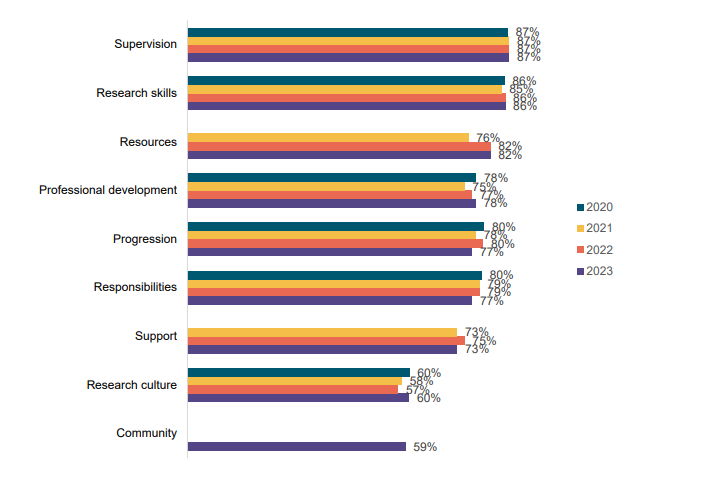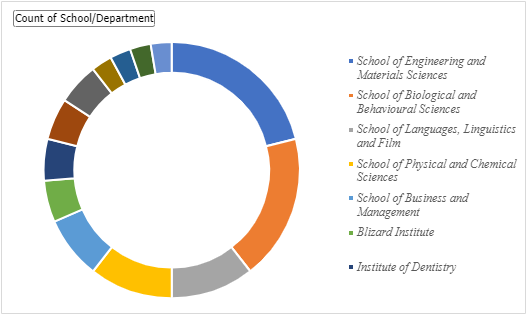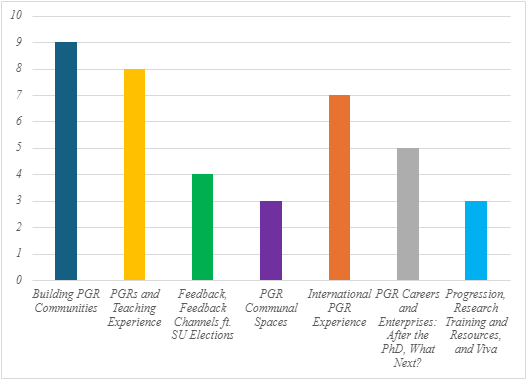Read highlights from the Postgraduate Consultation Groups and what we've been doing to improve your postgraduate experience at Queen Mary.


'It was definitely a very beneficial meeting for me. I learned a lot, and it was quite surprising to discover that other PGRs have gone through similar processes as me. If there are more meetings related to this, I would like to contribute.' - Postgraduate Consultation Group Participant
Great. Relevant. Beneficial.
These feedback comment descriptors encapsulate the range and energy of discussions that the Postgraduate Consultation Group (PGCG) meetings have enabled. The PGCG is a brainchild of both discussions in the 2022/23 Postgraduate Board subcommittee of Student Council, composed of postgraduate faculty representatives, and the Students’ Union Glow-Up Survey, to enhance student participation across the Students' Union.
The tedious task of tidy thinking: Improving all things PGR
Last winter, the annual Postgraduate Research Experience Survey (PRES) was published. Led by Advance HE, the 2023 survey highlighted key areas of improvement of postgraduate research (PGR) experience across UK universities in research culture and opportunities for PGRs to develop wider skills for a brighter career future. In this vein, the report spotlighted an increase in PGRs submitting papers for publication in books/journals, and in active participation in coaching and mentoring opportunities (pp. 35-36).

Fig. 1: Snapshot of insights from the PRES report (PRES, 2023)
However, there are further areas for improvement across the breadth of experiences within the UK’s PGR student population. In order to index the versatility of PGR experiences at QMUL, the team ran seven thematic PGCGs:
-
Building PGR Communities
-
PGRs and Teaching Experience
-
Feedback, Feedback Channels ft. SU Elections
-
PGR Communal Spaces
-
International PGR experience
-
PGR Careers and Enterprise: After the PhD, What Next?
-
Progression, Research Training and Resources, and Viva
It is important to note the extensive interest in the opportunity: at the close of the call for participants, over 74 PGRs submitted applications. A possible rationale for this could be linked to the strategy of incentivising the consultation group meetings for PGRs, offering them an opportunity to earn some money while supporting the Union’s work improving student experience. This overwhelming response for the first consultation meeting led the team to restructuring the experience with eight meeting opportunities across the entire academic year. Nonetheless, only seven of these were successful, with the last planned meeting around Public Engagement and Impact of PGRs, not registering any attendance. We prioritised the participation of all PGRs who had indicated interest in this call for applications, gauging their availability for each of the thematic meetings and scheduling participants accordingly using tiered first, second, and third choice options for preferred sessions. However, just over 50% of PGRs that indicated interest went on to participate in the meetings, putting the total number of participants at 38 PGRs across the seven PGCGs. It is good to note that this is a fairly common sign-up/attendance ratio for PGR-specific events hosted within past years at the Students’ Union.

Fig. 2: PGCG participants by department, with PGRs from the School of Engineering and Materials Sciences, and the School of Biological and Behavioural Sciences featuring the most.
The meetings were held online, and structured using predetermined questions drafted by the Postgraduate Research Representation Assistant and Vice President Communities, often developed in consultation with relevant stakeholders. These questions were shared a week ahead of the meeting, and determined the flow and structure of feedback during each session. Participants at a few sessions also fed back on the desire for in-person meetings to allow for more effective communication.
'I think it was great. The structure and the topic were understandable, everybody had the chance to express their opinions and thoughts. I would rather have a face-to-face meeting, but I also understand that sometimes it is not possible.' - Postgraduate Consultation Group Participant
Following the feedback on physical meetings, the team experimented with a hybrid meeting format (including catering), but the challenges of conflicting in-person availability and participation accessibility compounded the difficulties of planning and delivery, with the remaining sessions taking place virtually only. In spite of these shortcomings, the meetings were undoubtedly enriching avenues for good and effective connection among the PGRs, with participants pointing out the frank and receptive atmosphere that the meetings afforded them.
Great expectations: Learnings from the PGCGs
The PGCGs with the most attendance were the sessions on Building Communities, PGRs and Teaching Experience and International PGR Student Experience. These areas with the most interest coincide with the previous Postgraduate Engagement Research Report published in April 2022 by the Union’s previous Postgraduate Engagement Assistant. This report outlined issues around feelings of isolation and disconnection by many PGRs, as well as the challenges that international students face with integration and cultural/linguistic barriers.

Fig. 3: Snapshot of attendance across all the PGCGs
The PGCG meetings afforded mature and candid conversations around personal and collective experiences, highlighting areas where things are working great, and offering suggestions for making other areas better. Some of the key areas that emerged across these different themes are:
-
In the area of community building, PGRs shared the necessity of organising more social events that creatively combine networking opportunities with engaging and interactive activities across schools/departments. They also highlighted the importance of increasing agency for PGRs to organise and host their own social events through budgetary allocations at the School/Institute level to support these initiatives. The students further shared the importance of greater Students’ Union support for PGRs, by easing regulations for PGRs to set up societies as well as increased support to run events through financial incentives.
-
On the topic of PGRs and Teaching, PGRs emphasised the importance of a more systematic and structured approach to introducing students to teaching across the university, and the necessity of more Teaching Assistants/Associates. The participants also highlighted the crucial role of better feedback channels on their teaching styles and methods to allow for improvement.
-
Participants pointed to the necessity for a good and robust mentoring programme for PGRs within Schools/Institutes and shared spaces. They also pointed out that to enhance participation of PGRs in Students’ Union activities, it would be great to have PGR-specific communication within the SU.
-
On the topic of international PGR student experience, participants argued for the relevance of a clear PGR roadmap, detailing the entire PGR journey and process and clarity on the different portals for incoming students. The participants also identified the necessity of a bank branch on-campus to help with students’ access to banking needs, especially tailored to deal with student-specific challenges. Points around review of on-campus PGR housing accommodation prioritisation also highlighted challenges of international students with accessing good accommodation.
-
On the area of PGR Careers and Enterprise, participants shared the need for greater involvement of academics within the areas of career advisory, citing the provision of specific toolkits for PGRs looking to stay and progress within academia. They also identified the roles that the alumni community could play in offering useful case studies of successful career growth within academia as well as transitioning to industry. It is worth noting that there are already some of these events offered by CPD at QMUL, and as such, increased visibility for these events could assist PGRs to be more aware of them.
-
On PGR-specific communal areas, participants suggested clearer and targeted publicity of existing communal spaces to enhance awareness and use. It was noted that many PGRs were unaware of the existing spaces for PGRs across the university. Students also pointed out that the Graduate Centre’s Graduate Study Space is often occupied by undergraduate students who either tailgate or simply ask to be let in.
-
In the area of progression, training and research resources, and vivas, participants shared the importance of having clearer signposting via emails/explanatory sessions on the progression requirements/processes. Participants, however, cited the beneficial use of the Doctoral College’s Skills Points System in assessing their progress and keeping track of their growth through their research programme.
Conclusion: JOIN US for more insights into the PGCG experience!
Across this variety of experiences, it is important to note that the participants shared a collective sense of responsibility in contributing to making Queen Mary a great place for research and study. These were evident in the expressions of gratitude and contentment in having the opportunity to participate in the PGCG experience. Personally, planning and executing the PGCG meetings was a uniquely valuable learning experience, encountering PGRs from different disciplines, while appreciating this diversity of experiences and angles to the PhD journey.
The team is publishing an in-depth report on the entire experience to be shared with Stakeholders and the wider PGR community. On 10 July, 4pm-7pm, the team is also organising a PGR Palooza, which is a half-day event of networking and interaction, with the entire PGR community across the university. Further insights from the report will be shared at this event. Please find more information about our PGR Palooza, including the sign-up form and events programme, here.